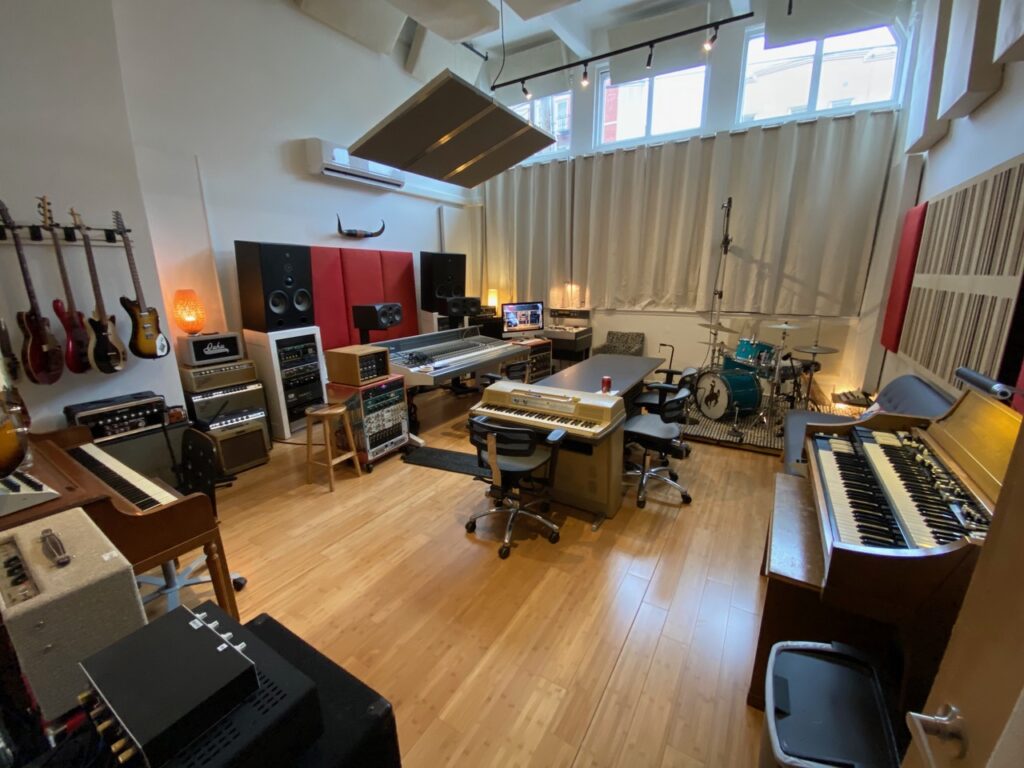
This month we’re talking with Eric Ambel who was kind enough to do our interview. I originally knew about Eric from his guitar slinging with Steve Earle but then learned of his prowess with The Del-Lords, The Yahoos and Joan Jett. These days he may be found on stage with Boston’s Sarah Borges or in some NYC bar with friends.
Name: Cowboy Technical Services Recording Rig
Location: Greenpoint, Brooklyn, NY Commercial Loft Building
Notable Artists: The Bottle Rockets, Steve Earle, Teddy Thompson, Laura Cantrell, Florence Dore, The Yayhoos, Marah, Sarah Borges, Jimbo Mathus, David Mansfield, Kasey Anderson, Robert Randolph, Steve Wynn, Los Lobos, John Doe, Tommy Womack, Mary Lee’s Corvette, Emily Duff, Jerry Joseph
How did you start the studio or what led you to start the studio?
Engineer Tim Hatfield and I had been working together and area studios and decided we needed our own place where we could have all of our recording gear and a pretty complete collection of instruments and amps for people to use. We wanted to make sure the maintenance was tip top and that everything would be working for people whenever they came.
How do you go about finding new gear for the studio and what’s your favorite toy?
We try to keep an eye on what’s out there and what might be helpful to us and our clients. A recent acquisition was our UnFairchild 670 Mk II Stereo tube compressor. It’s a big honkin’ thing that has more tubes than 2 Fender Deluxe Reverbs. It sounds mighty good. Everything goes through that compressor on the way to our Studer 1/2 analog deck when we are mixing.
Name 1 or 2 favorite/most meaningful sessions/albums from the studio.
We’ve been in business for over 25 years. We’re in our 3rd location in Brooklyn. The beauty of a recording studio is that something new happens almost every day you go in there. For me having the Bottle Rockets asking me to produce them again after several albums with other producers and coming to my studio to do the Lean Forward album was pretty memorable.
Name 1 or 2 most surprising moments in the studio.
Having my old friends Los Lobos come in for a day to record a song from scratch for a Public TV show was pretty wild. David Hidalgo didn’t bring a guitar. Mario Viele showed him the guitar booth and David saw our cheap knock off electric Sitar and played that all day.
What’s the best/worst part of running a studio?
The best part is knowing that through your work you are prepared for almost anything. Worst part would be the ’tire kicker’ client.
What was the first session done at the studio?
Tim and I had quite a lot of gear parked at another studio. The time came and we had to get it out of there. The only place we could move it to was a band I worked with named Martin’s Folly’s rehearsal room. We were gonna store our stuff there but we realized we could set up around them as they were. We recorded them in their practice space without moving any of their stuff. That became our first studio.
Is there a non-musical aspect of the studio you are proud of?
We’re pretty proud of keeping a business going in NYC for over 25 years.
How would you describe the vibe in your studio? How do you maintain it?
Before we started at our first location we had the opportunity to work in a big open room studio, where the drums and the band were in the same room as the console. Working that way was a real eye opener. I had heard about The Band recording their self-titled record like this at Sammy Davis Jr’s pool house and also was familiar with Daniel Lanios studio in New Orleans that was set up in a similar manner. We set our place up this way and we’ve maintained that direction through all 3 locations. We have a booth and some special isolated guitar speaker cabinets but we are all working for the most part in the same room. I refer to our setup as “One Room Plus”. The communication is really exceptional. It’s an inspiring experience to work that way. It’s nice to spend your time in the larger room as opposed to a smaller control room. We’ve really enjoyed that and also having windows and natural light. Again we really pride ourselves on keeping all of our equipment it top shape and having a larger collection of instruments so if somebody says, “boy, it would be cool to have a baritone guitar on this tune” or a 12 string or a Wurlitzer electric piano we’ve got those things literally within reach for our artists.
Final thoughts.
Thank you for asking me about Cowboy Technical. As I’ve said above, we really love helping people with their music. It means a lot to us when people bring us their songs.
